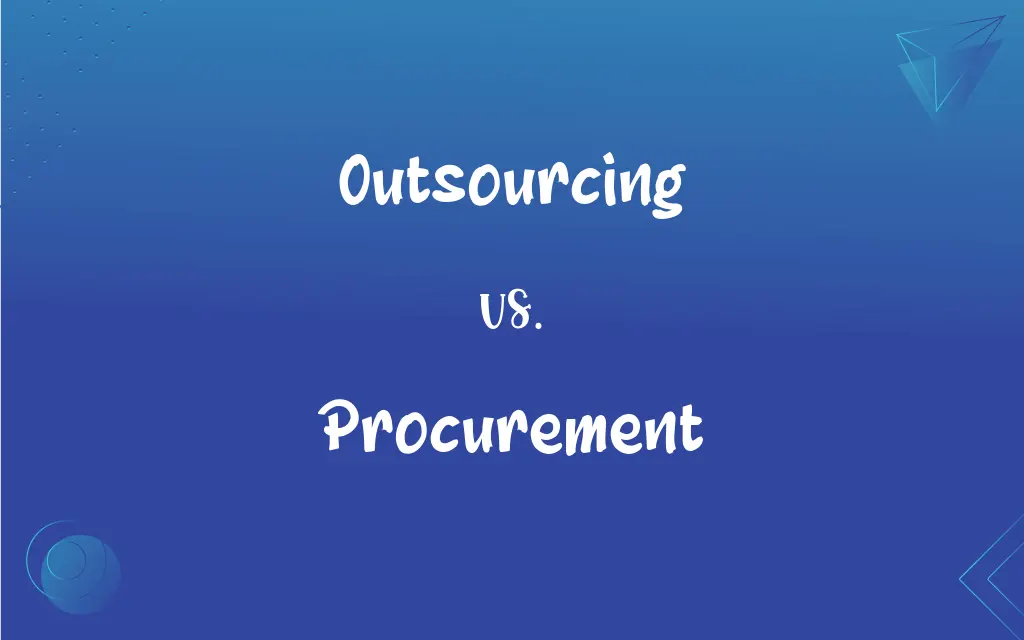Outsourcing vs. Procurement: What's the Difference?
Edited by Harlon Moss || By Janet White || Updated on October 7, 2023
Outsourcing involves delegating specific tasks or operations to third-party entities, while procurement pertains to the process of obtaining goods or services.

Key Differences
Outsourcing and procurement are both significant aspects of business management, but they serve different functions. Outsourcing primarily refers to the business practice of transferring certain tasks or functions, which were traditionally performed in-house, to external providers. Companies may opt for outsourcing to save costs, access specialized expertise, or focus on core competencies.
In contrast, procurement is the process of finding, acquiring, and buying goods, services, or works, often via a tendering or competitive bidding process. Procurement ensures that the company gets the necessary resources at the best possible price, considering factors like quality, quantity, time, and location. It's a strategic function that aims to optimize operations and reduce risks.
It's possible to see the interaction between outsourcing and procurement in many businesses. For instance, a company might decide to outsource its IT services to a third-party provider. The process of selecting the best IT service provider, negotiating the terms, and finalizing the contract falls under procurement.
However, not all procurement involves outsourcing. A company might procure raw materials for its production without outsourcing the production process. Similarly, while all outsourcing requires some procurement process (selecting the third-party provider), not all procurement activities lead to outsourcing.
Comparison Chart
Grammatical Role
Noun (referring to delegation of tasks)
Noun (referring to acquiring goods/services)
ADVERTISEMENT
Primary Purpose
Transfer specific tasks or operations to third parties
Obtain goods or services
Scope
Can involve entire operations or just specific tasks
Can be broad (e.g., company-wide) or specific
Associated Risks
Dependency on external entities, quality control
Supplier risks, price volatility, delivery risks
Strategic Function
Reduce costs, access expertise, focus on core operations
Optimize operations, reduce risks, achieve value
Outsourcing and Procurement Definitions
Outsourcing
Delegating tasks to external entities.
The company considered outsourcing its customer service.
ADVERTISEMENT
Procurement
The process of obtaining goods or services.
The department was responsible for the procurement of office supplies.
Outsourcing
Externalizing non-core operations.
Outsourcing the data entry tasks freed up internal resources.
Procurement
Securing necessary items via tendering or bidding.
Procurement methods vary based on the item's nature and value.
Outsourcing
Contracting work outside a firm.
Outsourcing can offer access to specialized expertise.
Procurement
Acquiring resources for organizational use.
Procurement of quality materials ensured product durability.
Outsourcing
Hiring another company to handle certain functions.
The decision of outsourcing manufacturing was strategic.
Procurement
Strategic acquisition of essential resources.
Effective procurement strategies can significantly reduce costs.
Outsourcing
Transferring in-house functions to third parties.
Outsourcing the IT department saved significant costs.
Procurement
To get by special effort; obtain or acquire
Managed to procure a pass.
Outsourcing
To delegate (a task, function, or responsibility) to an independent provider
"Most retailers outsource the bulk of their manufacturing to Third World countries, where labor is dramatically cheaper" (James Surowiecki).
Procurement
To bring about; effect
Procure a solution to a knotty problem.
Outsourcing
To relocate or transfer (jobs) to another labor market
"Although the absolute number of jobs outsourced from developed countries to China remains small, the threat that firms could produce offshore helps to keep a lid on wages" (The Economist).
Procurement
To obtain (a sexual partner) for another.
Outsourcing
Inflection of outsource
Procurement
To obtain sexual partners for others.
Outsourcing
The transfer of a business function to an external service provider.
Procurement
(uncountable) The purchasing department of a company.
Procurement
(countable) The act of procuring or obtaining; obtainment; attainment.
He was responsible for the procurement of materials and supplies.
I have a lot of experience in the procurement of construction materials and sub-contracts.
Procurement
Efficient contrivance; management; agency.
They think it done by her procurement. -Dryden.
Procurement
The act of procuring or obtaining; obtainment; attainment.
Procurement
Efficient contrivance; management; agency.
They think it doneBy her procurement.
Procurement
The act of getting possession of something;
He was responsible for the procurement of materials and supplies
Procurement
The act of sourcing and purchasing.
The procurement team finalized the contract with the vendor.
FAQs
Why do companies opt for outsourcing?
Companies might outsource to save costs, access specialized skills, or focus on core operations.
Is there a difference between procurement and purchasing?
Yes, procurement is broader, covering the entire process, while purchasing is the act of buying.
Is customer support a commonly outsourced function?
Yes, many companies outsource customer support to access expertise or operate 24/7.
How do businesses ensure ethical procurement?
They set guidelines, vet suppliers, and may opt for sustainable or fair-trade products.
What are the risks associated with outsourcing?
Potential risks include quality issues, dependency on third parties, and loss of internal expertise.
Does outsourcing always mean sending jobs overseas?
No, outsourcing can be domestic or international. Sending jobs overseas is termed "offshoring."
Is procurement only about buying physical goods?
No, procurement encompasses acquiring both goods and services.
Can a company outsource its procurement process?
Yes, some companies outsource procurement to third-party specialists or procurement service providers.
How does procurement add value to a business?
It ensures quality resources at optimal prices, manages supplier relationships, and reduces risks.
Is cost the only factor considered in procurement?
No, factors like quality, supplier reliability, and delivery timelines are also vital.
How does technology impact procurement?
Technology streamlines procurement via software, automates tasks, and offers data analytics for better decisions.
How do companies manage procurement relationships?
Through regular communication, performance reviews, and renegotiating contracts as needed.
What roles are integral to the procurement process?
Roles such as procurement managers, buyers, and supply chain analysts are crucial.
Can outsourcing lead to job losses within a company?
Potentially, as tasks moved to third parties might reduce the need for in-house roles.
What's a primary concern when considering outsourcing?
Ensuring that the third-party provider aligns with the company's values, quality standards, and objectives.
About Author
Written by
Janet WhiteJanet White has been an esteemed writer and blogger for Difference Wiki. Holding a Master's degree in Science and Medical Journalism from the prestigious Boston University, she has consistently demonstrated her expertise and passion for her field. When she's not immersed in her work, Janet relishes her time exercising, delving into a good book, and cherishing moments with friends and family.
Edited by
Harlon MossHarlon is a seasoned quality moderator and accomplished content writer for Difference Wiki. An alumnus of the prestigious University of California, he earned his degree in Computer Science. Leveraging his academic background, Harlon brings a meticulous and informed perspective to his work, ensuring content accuracy and excellence.
































































